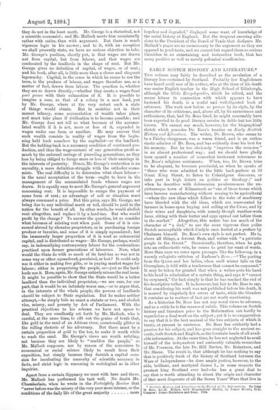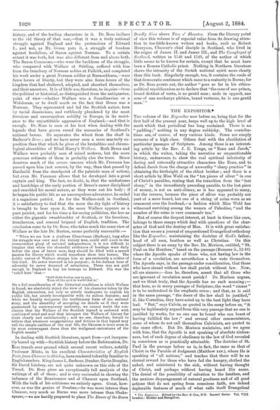EARLY SCOTCH HISTORY AND LITERATURE.* THIS volume may fairly be
described as the revelation of a literary loss sustained by Scotland. Probably few Englishmen have heard until now of its author, who at the time of his death was senior English teacher in the High School of Edinburgh, although the Globe Encyclopcedia, which he edited, and the severe labour in connection with which appears to have hastened his death, is a useful and well-digested book of reference. The work now before us proves by its style, by the character of its criticisms, and, above all, by its earnestness and enthusiasm, that, had Dr. Ross lived, he might reasonably have been expected to do good literary service in fields but too little known. We cannot say much, however, for the biographical sketch which precedes Dr. Ross's treatise on Early Scottish, History and Literature. The writer, Dr. Brown, who seems to be a Paisley clergyman, was a warm friend, and is an enthu- siastic admirer of Dr. Ross, and. has evidently done his best for his memory. But he too obviously "improves the occasion" in an almost professional way ; and we should have gladly been spared a number of somewhat irrelevant references to Dr. Ross's religious sentiments. When, too, Dr. Brown tries to be eloquent, he becomes provincial, as when he speaks of "those who were admitted to the little back-parlour at 30 Great King Street, to listen to Coleridgean discourse, or take part in high debate on politics or theology ;" and when he describes with Johnsonian ponderousness the un- picturesque town of Kilmarnock as "one of those towns which have become manufacturing without ceasing to be agricultural —where the new ideas which follow in the wake of machinery have blended with the old ideas, which are represented by farmers in home-spun buying and selling at the Cross, and by their wives and daughters, with comely though weather-worn faces, sitting with their butter and eggs spread out before them in the market." Altogether, this notice has too much of the character of "a dud," to use the more vigorous than polite Scotch monosyllable which Carlyle once hurled at a preface by Chalmers himself. Dr. Ross's own style is not perfect. He is, above all things, a fervent Scot, and writes with "a patriotic gurgle in the throat." Occasionally, therefore, when he gets into an enthusiastic vein, he comes to grief for want of words. More than once we come upon passages like the following, in a warmly eulogistic criticism of Barbour's Bras :—" The parting from the Queen and her ladies, when Buell winter falls on the Grampians, is told with a tenderness that cannot be surpassed." It may be taken for granted that when a writer puts his hand to his head in admiration of a certain thing, and says it "cannot be surpassed," the fact simply is that he has reached the end of his descriptive tether. It is, however, but fair to Dr. Ross to say, that considering his work was not published before his death, it is marred by singularly few errors of taste, while the blunders it contains as to matters of fact are not worth mentioning.
As a historian Dr. Ross has not any novel views to advance, and as a critic he is the reverse of subtle. This volume on Scotch history and literature prior to the Reformation can hardly be regarded as a final work on the subject ; yet it is no exaggeration to say that it is the best manual of the two subjects of which it treats, at present in existence. Dr. Ross has evidently had a passion for his subject, and has gone straight to the ancient re- cords, both Scotch and English, as the fountain-heads of all avail- • able information. At the same time, he has not neglected to avail himself of the independent and eminently valuable researches of Mr. Freeman, the late Dr. Hill Burton, MT. Robertson, and Mr. Skene. The result is, that although he has nothing to say that is positively fresh of the history of Scotland between the Wars of Independence—he does ample justice, however, to the able, brilliant, and martyred James I., in some respects the greatest king Scotland ever had—he has a great deal to say that is worth attending to about the origin and character of that most desperate of all the Seven Years' Wars that live in
* Scottish History and Literature to the Period of the Reformation. By John M. Ross, LL.D. Edited. itith Biographical Sketch, by James Brown, D.D. Glasgow : James Madehose and Sons. 1B84..
history, and of the leading characters in it. Dr. Ross inclines to the old theory of that war,—that it was a truly national struggle against England and the pretensions of Edward I., and not, as Mr. Green puts it, a struggle of freedom against feudalism, of Saxon against Norman. To a certain extent it was both, but was also different from and above both. The Saxon Commons,—who were the backbone of the struggle, who conquered with Wallace at Stirling, suffered with him from the treachery of Norman nobles at Falkirk, and completed his work under a great Norman soldier at Bannockburn,—were fierce lovers of liberty, but they were also fierce lovers of the kingdom that had sheltered, adopted, and absorbed themselves, and their ancestors. It is of little use, therefore, to inquire—from the political or historical, as distinguished from the antiquarian, point of view—whether Wallace was a Scandinavian or a Welshman, or to dwell much on the fact that Bruce was a Norman. They represented and led the Scottish nation, torn by racial dissensions, and ruthlessly plundered by the most ferocious and unscrupulous nobility in Europe, in its resist- ance to the unjustifiable aggression of England,—and that is enough. Dr. Ross is seen at his best when dealing with the legends that have grown round the memories of Scotland's national heroes. He separates the wheat from the chaff in Barbour's Bros; and we have never seen a more masterly ex- position than that which he gives of the brutalities and chrono- logical absurdities of Blind Harry's 1Vallace. Both Bruce and Wallace were probably men of mixed motives, but the more generous estimate of them is probably also the truer. Bruce deserves much of the severe censure which Mr. Freeman has passed upon him (not severer, by the way, than that passed by Garibaldi from the standpoint of the patriotic man of action), but even Mr. Freeman allows that he developed into a great captain and king. The fact, no doubt, is, that the misfortunes and hardships of the early portion of Bruce's career disciplined and ennobled his moral nature, as they wore out his body ; if he began his public life as an unscrupulous adventurer, he ended it a sagacious patriot. As for the Wallace-cult in Scotland, it is satisfactory to find that the more the dry light of history is brought to bear upon it, the more Wallace appears as a pure patriot, and for his time a far-seeing politician, the less as either the gigantic swashbuckler of Scottish, or the ferocious, treacherous, and sensual brigand of English, tradition. The conclusion come to by Dr. Ross, who takes much the same view of Wallace as the late Dr. Burton, seems perfectly reasonable :—
"When we see bow a studious Churchman (Barbour), long after the struggle was over and the victory won, could still exult in the transcendent glory of national independence, it is not difficult to imagine that when the shameful evidences of bondage were daily before the eyes of brave men, they should be filled with a sacred passion for liberty which would transform them into heroes. The public career of Wallace stamps him as pre-eminently a soldier of this kind. He never wavered in his purpose ; in his darkest hour of adversity he never dreamed of submission. There was not gold enough in England to buy his homage to Edward. His was the ' nobill hart' that— Sold think fredom mar to pris, Than all the go!ii in wand that is.'
On a full consideration of the historical conditions in which Wallace is found, we absolutely reject the view of his character taken by the English chroniclers, not only as utterly inadequate to explain his public life, but utterly incompatible with its salient features; and while we frankly recognise the traditionary form of the national story, and the absurdity of accepting its details as if they were guaranteed by contemporary authority, we cannot resist the con- clusion that the Wallace of the Scottish legend is endowed with qualities of mind and soul that interpret the Wallace of history far more clearly and satisfactorily ; and we are, therefore, forced to believe that whatever exaggerations and fictions in that legend may veil the simple outlines of the real life, the likeness is truer even in its most extravagant dress than the malignant caricatures of the English monks."
In dealing with Scottish literature, apart from—yet insepara- bly bound up with—Scottish history before the Reformation, Dr. Ross travels over ground which several recent writers, notably Professor Minto, in his excellent Characteristics of English Poets from Chaucer to Shirley, have rendered tolerably familiar to English readers. King James I., Barbour, Dunbar, Gavin Douglas, Sir David Lindsay, are not quite unknown on this side of the Tweed. Dr. Ross gives an exceptionally full analysis of the writings of all of these ; and is very successful in showing the influence of the Renaissance and of Chaucer upon Scotland. With the bulk of his criticisms we entirely agree. Great, how- ever, as was the genius of Dunbar,—he was more intense than Chaucer, very much as Burns was more intense than Shake- speare,—we are hardly prepared to place The Dance of the Seven Deadly Sins above Tam o' Shanter. From the literary point of view this volume is of especial value from its drawing atten- tion to toodittle-known writers and books, such as Robert Henryson, Chaucer's chief disciple in Scotland, who lived in the reigns of James II. and James III., and The Complaynt of Scotland, written in 1548 and 1549, of the author of which little seems to be known for certain, except that he must have been a Roman Catholic priest. Nothing in Northern literature shows the intensity of the Scotch national spirit more clearly than this book. Singularly enough, too, it contains the seeds of that democratic sentiment which came to a maturity in Burns; for as Dr. Ross points out, the author "goes so far in his ethico- political republicanism as to declare that the cone of ane prince, beand clistitut of vertu, is no gentil man ; ande in opposit, ane sone of ane mechanyc plebien, beand verteous, he is ane gentil man.'"



































 Previous page
Previous page